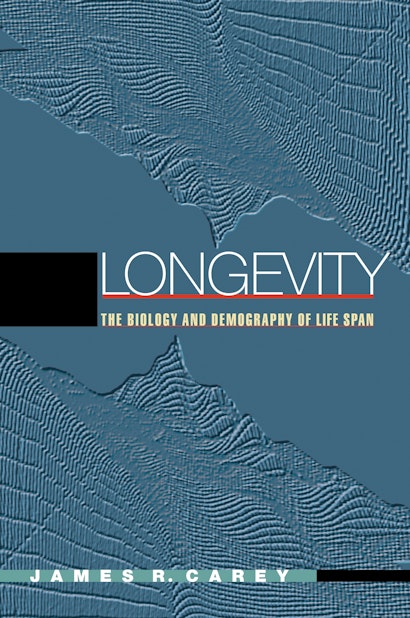Despite our deep interest in mortality, little is known about why some individuals live to middle age and others to extreme old age. Life span, mortality, and aging present some of the most profound mysteries in biology. In Longevity, James Carey draws on unprecedented data to develop a biological and demographic framework for identifying the key factors that govern aging, life span, and mortality in humans and other animals.
Carey presents the results of a monumental, twelve-year, National Institute on Aging-funded research project on the determinants of longevity using data from the life tables of five million Mediterranean fruit flies, the most comprehensive set of life table studies ever on the mortality dynamics of a single species. He interprets the fruit fly data within the context of human aging and the aging process in general to identify the determinants of mortality. Three key themes emerge: the absence of species-specific life span limits, the context-specific nature of the mortality rate, and biodemographic linkages between longevity and reproduction.
A powerful foundation for the emerging field of biodemography and a rich framework for considering the future of human life span, Longevity will be an indispensable resource for readers from a range of fields including population biology, demography, gerontology, ecology, evolutionary biology, and medical research.
James R. Carey is Professor and former Vice Chair of Entomology at the University of California, Davis, and Senior Scholar of the Center for the Economics and Demography of Aging at the University of California, Berkeley. Principal investigator for the research project this book is based upon, he is the author of Applied Demography for Biologists and the lead author of Longevity Records: Life Spans of Mammals, Birds, Amphibians, Reptiles and Fish.
"I strongly recommend the book to researchers, students, and other readers interested in longevity and aging. . . . Both the experimental findings and the theoretical discussions in this book are new and important contributions to our understanding of life span."—Shiro Horiuchi, Population and Development Review
"This book definitively announces a scientific revolution in our
understanding of life history, aging, demography, and kindred subjects. . . . Longevity is one of those rare scientific books that has something both important and new to say."—Michael R. Rose, Bioscience
"Not only a fascinating tour of a major research initiative, but also an informative record of how science actually works. I read it with growing interest as the questions and problems unfolded with each new chapter."—John Speakman, Biologist
"Jim Carey's fine monograph is the first single-authored exposition on the 'the biodemography of aging' This important new trans-disciplinary subject seeks to explain the actuarial trends of aging at all levels of biological mechanisms. Carey draws heavily from his pioneering studies of medflies that, like humans, show declining mortality rates at later ages. His medfly gerotron continues to generate challenging mysteries, such as the bimodal mortality pattern of infertile flies. The book is rich in its clear expositions of complex questions in aging and well-designed illustrations, which I predict will give it a long shelf life."—Caleb E. Finch, ARCO Professor in the Neurobiology of Aging, University of Southern California
"This is an important book. It provides a timely critical account of a fundamental body of work on aging and sets the stage for a new set of paradigms about senescence generally and human aging in particular, taking the first serious look at this development."—Shripad Tuljapurkar, Stanford University and University of California, Berkeley
"In this book, James Carey summarizes about a dozen years of his work on medfly demography and its implications. The overarching themes are important and innovative. And the careful attention to detail, both biological and statistical, is excellent."—Marc Mangel, University of California, Santa Cruz
"Longevity synthesizes a huge body of data collected over a long period of time, making this work unquestionably without parallel. Furthermore, Longevity is an exceptionally well-written and thoroughly analyzed treatise on some of the most important general questions in biodemography."—Thomas B. L. Kirkwood

